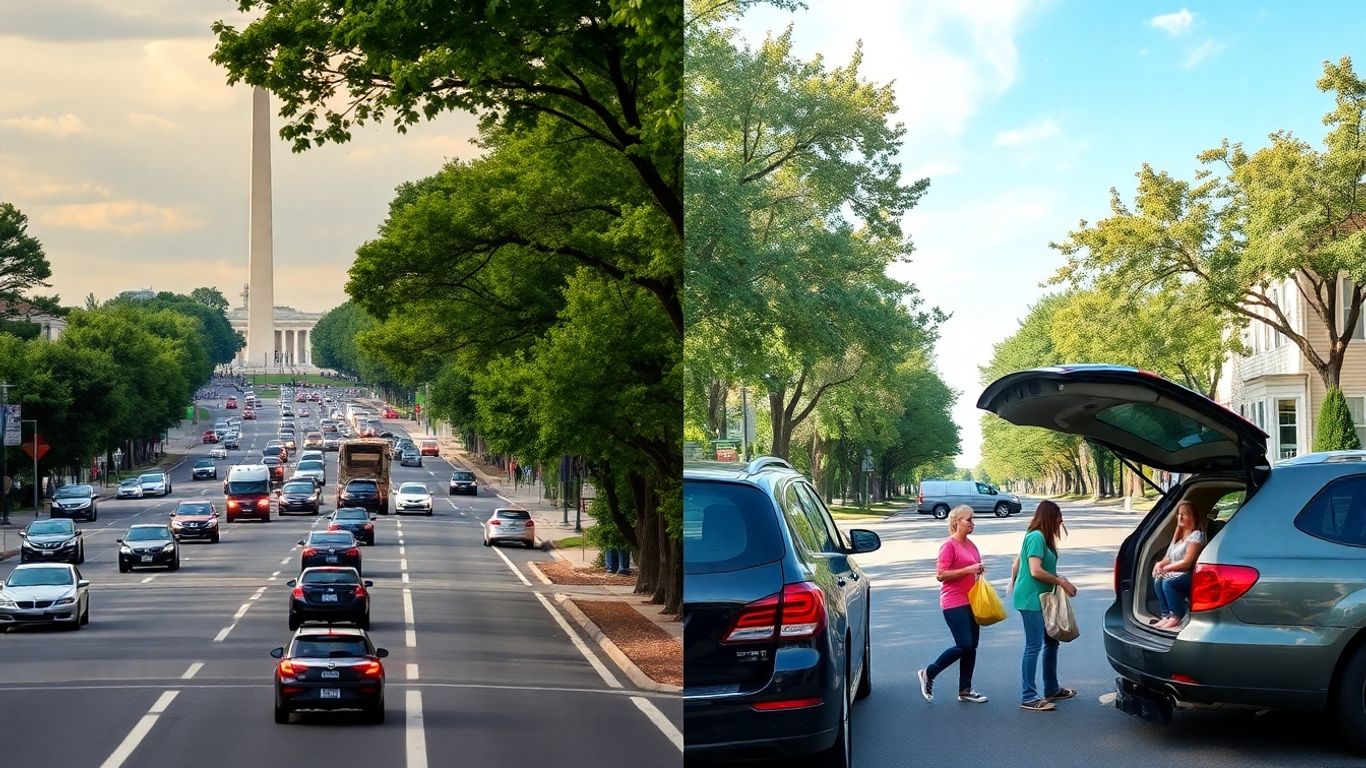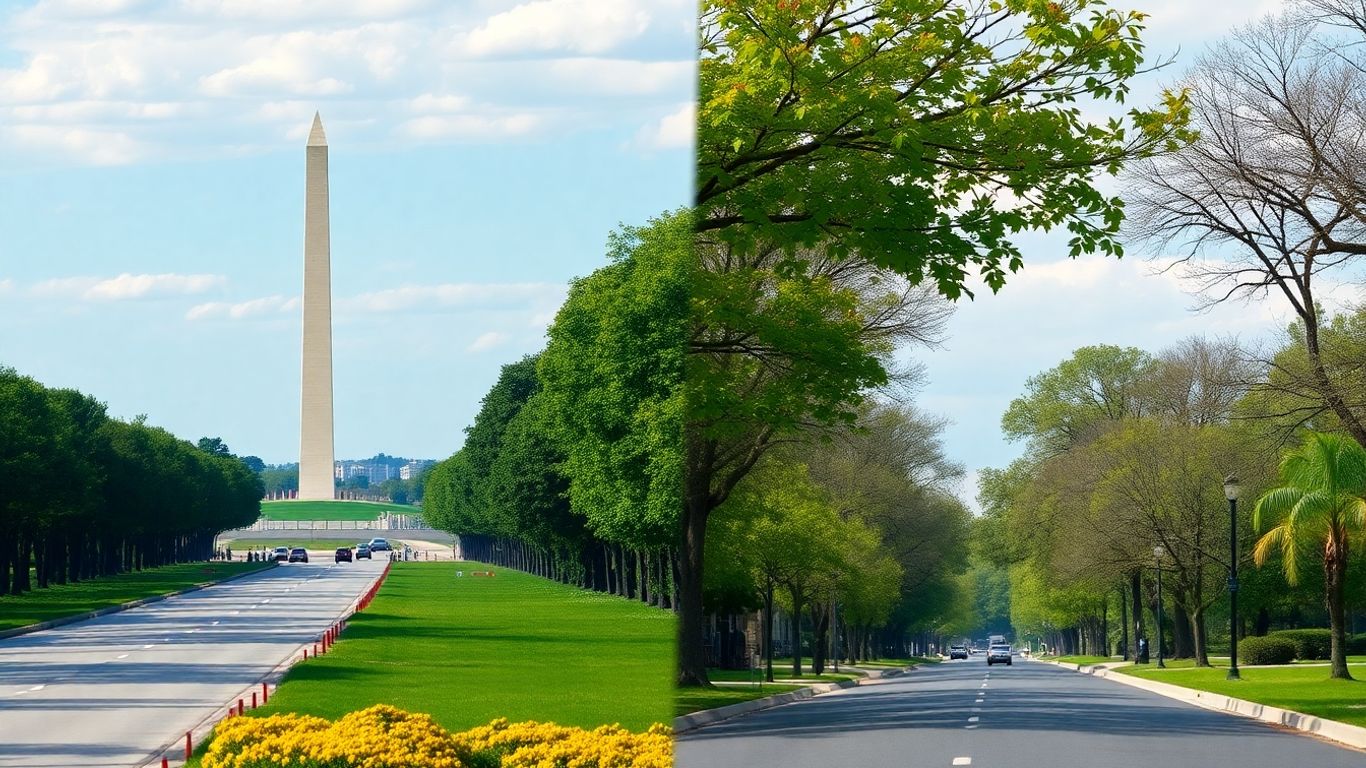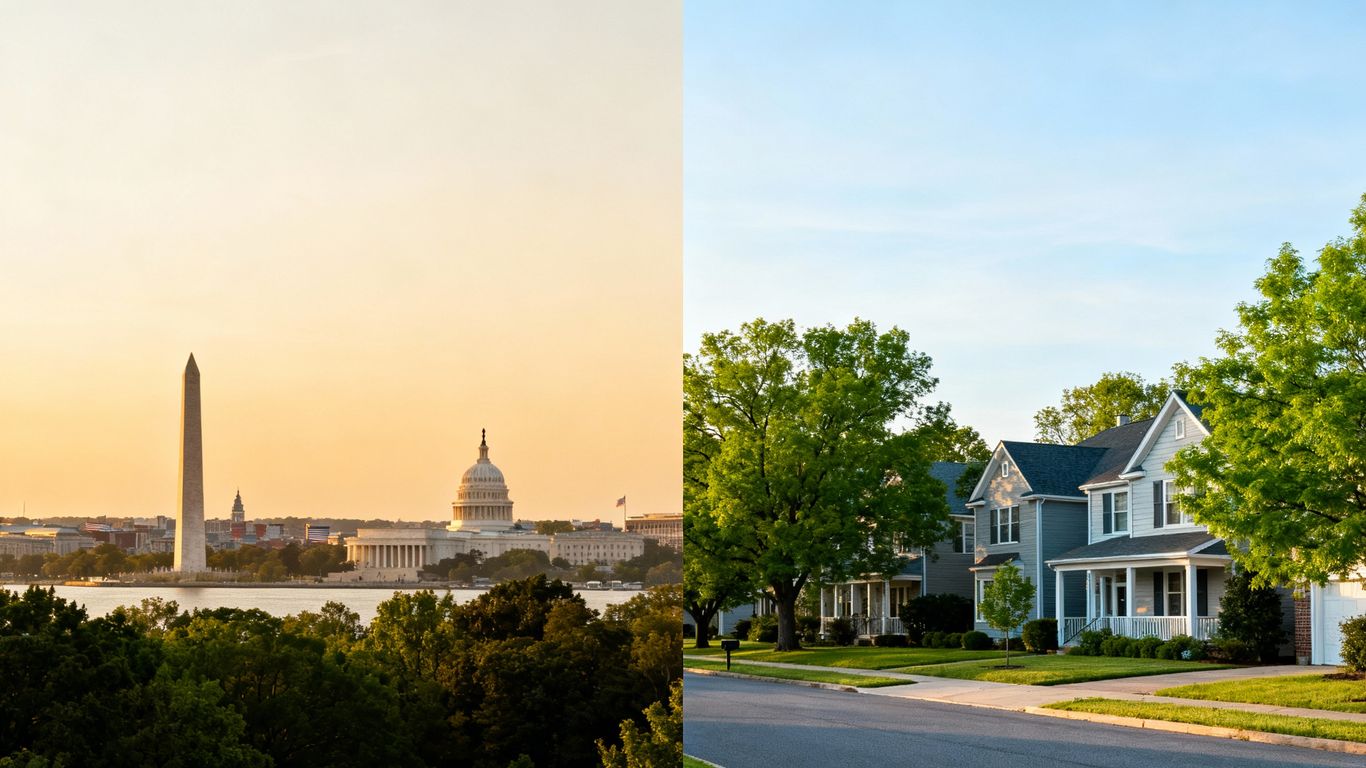Moving from D.C. to Northern Virginia? Here’s What Changes (and What Doesn’t)
Thinking about making the big move from Washington D.C. to the neighborhoods across the Potomac in Northern Virginia? It's a common transition for many, and while it might feel like staying close, there are definitely some shifts to be aware of. From how you get around to where you shop and even the general vibe of your surroundings, things can change. Let's break down what you can expect when moving from D.C. to Northern Virginia, covering the important stuff like traffic, cost, jobs, and what life is really like.
Key Takeaways
- Northern Virginia offers a different traffic experience than D.C., with its own set of rush hour patterns and public transit options that may require some adjustment.
- While some areas of Northern Virginia are quite pricey, especially those close to D.C., there are more affordable housing and living options available in other parts of the region.
- The job market in Northern Virginia is strong, with major industries like tech and government, offering proximity to D.C.'s opportunities while having its own significant employers.
- Northern Virginia boasts excellent schools and a family-friendly atmosphere, with diverse communities and a good quality of life, though neighborhood vibes can vary.
- Expect four distinct seasons, a rich cultural mix, and plenty of outdoor spaces for recreation, alongside some unique local aspects like a high concentration of data centers and specific state laws.
Navigating the Commute: Traffic and Transportation
Understanding Northern Virginia's Traffic Patterns
Okay, let's talk about getting around. If you're coming from D.C., you probably think you know traffic, but Northern Virginia has its own special brand of it. Rush hour here isn't just a suggestion; it's a way of life. Expect things to get pretty backed up, especially on major routes like I-66, I-495 (the Beltway), and I-395 during the typical morning and evening commutes. It's not uncommon for what should be a short drive to turn into a much longer ordeal. The population density means more cars, and while there are efforts to improve things, it's a constant challenge.
Public Transportation Options
While driving is common, you're not completely out of luck if you prefer not to be behind the wheel. Northern Virginia has a decent public transit network, though it's a bit spread out.
- Metrorail: The Washington D.C. Metro system extends into Northern Virginia, serving areas like Arlington, Alexandria, and parts of Fairfax County. This is often your best bet for getting into D.C. itself or moving between key urban centers.
- Virginia Railway Express (VRE): This commuter train service connects Fredericksburg and Manassas to Union Station in D.C. It's a good option if you live further out in the suburbs and work in the city.
- Local Buses: Various counties operate their own bus systems. Fairfax Connector, ART (Arlington Transit), and Loudoun County Transit all provide local routes and connections to Metrorail stations. They can be helpful for getting around within a specific county or reaching transit hubs.
Planning your route ahead of time is a good idea, especially when you're new to the area. Knowing the typical congestion times and alternative routes can save you a lot of frustration.
Tips for Daily Commuting
Getting your daily commute sorted out is key to settling in. Here are a few things to keep in mind:
- Test your route at different times: Before you commit to a daily drive, try making the trip during peak hours and off-peak hours to see the real difference. This will give you a realistic idea of travel times.
- Explore carpooling or vanpooling: Many employers in the area offer incentives for carpooling. Check with your workplace to see if there are any programs or resources available.
- Consider flexible work hours: If your job allows, shifting your work schedule slightly can make a big difference in avoiding the worst of the traffic.
- Get familiar with traffic apps: Apps like Google Maps or Waze are practically essential here. They provide real-time traffic updates and suggest the fastest routes, which can change by the minute.
The Cost of Living: Housing and Necessities

So, you're thinking about ditching D.C. for Northern Virginia? One of the first things that's probably on your mind is how much it's all going to cost. And yeah, it's a big question. While Northern Virginia offers a lot, including proximity to the capital, it definitely comes with a price tag.
Housing Market Near D.C.
Let's talk housing first. If you're looking at areas right on the border of D.C., like Arlington or Alexandria, expect to see prices that are pretty close to what you're used to, or maybe even a bit higher. Rent for a one-bedroom apartment can easily climb into the mid-$2000s, and buying a place? Well, that's a whole other ballgame. It's competitive, and you'll need to be ready to act fast. Many people find that the closer you are to the city, the more you'll pay for that convenience. It's a trade-off, for sure. If you're planning a move within D.C. itself, remember to look into licensed and insured movers to make the process smoother.
Affordable Alternatives in Northern Virginia
But don't despair! Northern Virginia isn't all million-dollar homes and sky-high rents. If you're willing to venture a little further out, you can find more budget-friendly options. Towns like Hopewell or Martinsville, while further from the D.C. hustle, offer significantly lower rents, sometimes under $1,500 a month for a decent place. You'll also find that property taxes tend to be lower in these areas, which can be a nice surprise. It's all about finding that sweet spot between commute time and your wallet.
Comparing Everyday Expenses
Beyond housing, other daily costs add up. Groceries, utilities, and transportation can be a bit higher than the national average. For instance, the overall cost of necessities in Virginia is reported to be around 4.2% higher than the U.S. average. This means your grocery bill might be a little bigger, and your utility payments could creep up, especially during those hot summers and cold winters. It's wise to budget a bit more for these day-to-day expenses when you're planning your move.
Here's a rough idea of how some costs compare:
When you're budgeting for a move to Northern Virginia, it's easy to focus just on rent or mortgage payments. But don't forget to factor in the smaller, recurring costs. Things like gas, groceries, and even your phone bill can add up faster than you think, especially in a high-cost-of-living area. A little extra padding in your budget for these everyday items can make a big difference in how smoothly you settle in.
Career Opportunities and Economic Landscape
Moving from D.C. to Northern Virginia means stepping into a job market that's both connected to the capital and has its own distinct strengths. While the proximity to D.C. is a huge draw for many, especially those in government or policy-related fields, Northern Virginia has cultivated a robust economy all its own. You'll find a strong presence in sectors like technology, defense, and cybersecurity, making it a hub for innovation and specialized careers.
Key Industries in Northern Virginia
Northern Virginia boasts a diverse economic base. It's not just about government jobs anymore, though that's still a significant part of the picture. Think about the booming tech scene, with a particular focus on data centers and cloud computing. Defense contractors and cybersecurity firms also have a massive footprint here, thanks to the proximity to federal agencies and military bases. Beyond that, you've got a growing healthcare sector and a solid presence in professional and business services.
- Technology: Software development, IT services, cybersecurity, and data analytics.
- Defense and Government Contracting: Supporting federal agencies and military operations.
- Biotechnology and Life Sciences: A growing area with research and development opportunities.
- Professional and Business Services: Consulting, legal services, and accounting.
Job Market Proximity to D.C.
Living in Northern Virginia offers a unique advantage for those looking to work in or around Washington, D.C. Many residents commute into the city for work, especially in fields like politics, law, and federal government. The public transportation options, like the Virginia Railway Express, make this commute more manageable than driving. However, it's worth noting that the federal job market has seen some shifts, and private sector growth has been slower recently, which might influence job availability in that specific area federal job loss.
Major Employers and Fortune 500 Companies
Northern Virginia is home to a significant number of major employers and has attracted a good number of Fortune 500 companies. These companies provide a wide range of job opportunities across various industries. Some of the big names you'll find include defense giants, major tech firms, and large healthcare providers. Having these established companies in the region means more stability and diverse career paths for residents.
The economic landscape here is quite dynamic. While it's closely tied to the federal government's presence, the growth in private sectors, particularly tech and defense, has created a strong, independent economic engine for the region. This blend offers a lot of potential for career growth.
Here's a look at some of the types of companies you'll find:
- Technology: Amazon (HQ2), Google, Microsoft, and numerous cybersecurity startups.
- Defense: Northrop Grumman, Lockheed Martin, BAE Systems.
- Healthcare: Inova Health System, Kaiser Permanente.
- Finance: Capital One, Freddie Mac.
Education and Family Life
When you're thinking about moving your family, education is probably high on your list. Northern Virginia doesn't disappoint here. The state is known for having a really solid education system, from kindergarten all the way through college. Many towns boast highly-rated public schools, which is a big draw for families. Plus, if you're looking at higher education for yourself or your kids, Virginia has some great options. You'll find well-regarded universities like George Mason University and James Madison University, and as a resident, you often get a break on tuition. It's a pretty good deal for quality education.
Renowned Educational Institutions
Virginia is home to a number of excellent schools. For K-12, many counties have districts that consistently rank high for academic performance and student-teacher ratios. When it comes to higher education, the state has a strong lineup. George Mason University, located in Fairfax, is a large public research university. James Madison University in Harrisonburg is known for its beautiful campus and strong programs. Virginia Tech, while a bit further west, is a major engineering and research powerhouse. The fact that in-state residents get lower tuition rates makes these institutions even more appealing for families planning to stay put for a while. It's definitely worth looking into the specific school districts in the areas you're considering.
Quality of Life for Families
Beyond the schools, Northern Virginia generally offers a good quality of life for families. You'll find plenty of parks, family-friendly activities, and a generally lower crime rate compared to some other major metropolitan areas. Many communities are quite safe, making it a comfortable place to raise kids. There's a good mix of suburban neighborhoods with yards and more urban living options, depending on what your family prefers. The proximity to D.C. also means access to world-class museums and cultural events, many of which are free or low-cost, offering great weekend outings.
Community and Neighborhood Vibes
What's it really like to live there day-to-day? Well, it varies a lot by town. Places like Falls Church and Fairfax City are often mentioned as having a strong community feel, with local events and a sense of togetherness. Old Town Alexandria has a historic charm and a lively atmosphere with lots of shops and restaurants. Chantilly is noted for its diversity and is popular with young professionals and families alike. You'll find that many neighborhoods have active community associations that organize events and keep residents connected. It's a good idea to visit a few different towns to get a feel for which one clicks with your family's style. It's a big change from D.C., but many find the transition to be a positive one for family life. If you're curious about the pros and cons of living in the state, this guide offers some honest insights about relocating to Virginia.
Moving from a busy city like D.C. to the suburbs of Northern Virginia often means trading some of that urban energy for a more settled, family-focused environment. While you might miss the constant buzz, you'll likely gain more space, quieter streets, and a strong sense of local community. It's a trade-off many families find well worth it for the benefits it brings to daily life and raising children.
Lifestyle and Culture
Embracing Four Distinct Seasons
Northern Virginia really does give you all four seasons, and it's something most people appreciate. You get those crisp, cool autumns with leaves changing color, which is pretty nice. Then winter rolls in, usually with some snow, but it's rarely extreme – think cold, but not usually brutal. Spring brings everything back to life, and summer can get pretty warm and humid, perfect for hitting up some of the local lakes or the coast.
Here's a general idea of what to expect temperature-wise:
It's a good idea to keep layers handy, as the weather can shift pretty quickly.
Cultural Diversity and Community
This area has become a real melting pot, especially in Northern Virginia. A lot of people have moved here over the years, bringing different backgrounds and traditions. You see it in the food, the festivals, and just the general vibe of the neighborhoods. It's pretty common to find communities with strong ties to their heritage while also being part of the larger local scene. This mix makes for a really interesting and dynamic place to live.
The population growth here has really shaped the social fabric, creating a blend of cultures that's pretty unique. It's not just one thing; it's a mix of many, and that's what makes it feel so alive.
Outdoor Recreation and Attractions
When you're not stuck in traffic, there's actually a lot to do outdoors. You've got the Chesapeake Bay not too far off, and places like Lake Anna and Smith Mountain Lake offer chances for boating and fishing. If you're a beach person, Virginia Beach is a popular spot, drawing crowds from all over. Plus, there are plenty of parks and trails if you just want to get out for a hike or a bike ride. It's a good balance between city life and getting out into nature.
- Boating and fishing on the Chesapeake Bay and various lakes.
- Hiking and biking trails in state and local parks.
- Visiting historical sites and monuments scattered throughout the region.
- Enjoying the beaches along the Atlantic coast.
Understanding Northern Virginia's Unique Aspects

The Role of Data Centers
Northern Virginia, particularly the "Data Center Alley" in Loudoun County, is a massive hub for the internet. It's pretty wild to think about, but a huge chunk of the world's online traffic actually flows through this area. We're talking about up to 70% of internet traffic, according to some estimates. This concentration of data centers means a lot of infrastructure, power needs, and a unique kind of economic activity that's different from your typical office jobs. It's a behind-the-scenes giant that keeps a lot of the digital world running.
Afghan Refugee Resettlement
Virginia has become a significant place for Afghan refugees looking to start new lives. Following events overseas, many families have resettled here, making Virginia home to the second-largest Afghan population in the U.S., right after California. This has added to the area's rich cultural tapestry, with new communities forming and contributing to the local fabric. It's a testament to the area's welcoming spirit, though it also brings its own set of community support needs.
Virginia's Quirky Laws
Like many places, Virginia has its share of laws that might seem a little odd to newcomers. For instance, there are some old ordinances that have been updated, like the one about trick-or-treating ages. You might also run into rules about hunting on Sundays or even some really specific ones, like a law that prohibits tickling women. It's just a reminder that every place has its own history and its own set of regulations, some more practical than others. It's part of what makes each locality distinct.
Moving to a new area often means getting used to new routines and local customs. Understanding these unique aspects, from the digital infrastructure to community initiatives and even some peculiar local laws, can help make the transition smoother. It's all part of getting to know your new home.
When you're planning your move, especially if you're bringing a lot of belongings, looking into licensed movers in Virginia is a good first step. Verifying their credentials and getting detailed estimates can save a lot of headaches down the road.
Northern Virginia is a special place with its own unique charm. From its historic roots to its modern growth, it offers a blend you won't find anywhere else. Thinking about moving here or within this vibrant area? Let us help make your move smooth and stress-free. Visit our website today to learn more about our services and get a free quote!
So, What's the Verdict?
Moving from D.C. to Northern Virginia definitely comes with its own set of adjustments. You'll find many of the same conveniences and opportunities you're used to, especially if you're staying within the broader metro area. The job market is strong, and there's a lot to do, just like in the city. However, be prepared for some changes, like potentially different traffic patterns and maybe a slightly different vibe depending on where you land. Ultimately, whether it's a good fit really depends on what you're looking for. Weigh the good with the not-so-good, and you'll figure out if this part of Virginia is the right next step for you.
Frequently Asked Questions
What's the biggest change when moving from D.C. to Northern Virginia?
One of the biggest differences you'll notice is the traffic. While D.C. has its own busy roads, Northern Virginia's commute can be quite a challenge, especially during rush hours. Getting around might take longer, and you'll want to learn the best routes and times to travel.
Is Northern Virginia expensive to live in?
Yes, living in Northern Virginia, especially close to D.C., can be pretty pricey. Housing costs, like rent or buying a home, are higher than in many other parts of the country. Everyday things like food and other necessities can also add up, costing a bit more than the average.
Are there good job opportunities in Northern Virginia?
Absolutely! Northern Virginia has a strong job market with many opportunities, particularly in tech, government, and defense industries. Being so close to D.C. also opens doors to many jobs in the capital. Plus, there are many big companies located there, offering lots of career choices.
What's the difference in lifestyle between D.C. and Northern Virginia?
D.C. is a bustling city with a fast pace, full of museums and government buildings. Northern Virginia offers a mix – you can find lively areas close to the city, but also quieter, more suburban neighborhoods with parks and family-friendly vibes. It's like getting a bit of both worlds.
What are some fun things to do in Northern Virginia?
There's plenty to explore! Northern Virginia has beautiful parks for outdoor adventures like hiking and biking, historical sites to visit, and a growing food scene. You can enjoy all four seasons, from warm summers to crisp autumns, and there are many community events and festivals throughout the year.
Does Northern Virginia have good schools?
Yes, Northern Virginia is known for having excellent schools, both public and private. Many families move here because of the strong educational system. You'll find highly-rated schools that are great for kids of all ages, from elementary to high school.












